Empowering Education Leaders: Combating Outdated Teaching Models
Andy Storch recently connected with Kami Lewis Levin, a distinguished expert in educational leadership, on an episode of the Talent Development Hot Seat Podcast. Kami, with over two decades of experience in the education sector, shared her valuable expertise on fostering leadership and addressing systemic challenges in education. Below are actionable steps inspired by their conversation, designed to help educational organizations implement lasting, impactful changes.
Address the Outdated Education System
Kami emphasized the urgent need to address the declining proficiency in reading and math among students. Tackling these challenges requires systemic change through intentional strategies:
- Evaluate and Modernize Curriculum: Regularly review the curriculum to ensure it aligns with modern educational needs, integrating critical thinking skills to prepare students for a rapidly changing world.
- Integrate Technology: Leverage technological tools and platforms to create engaging and relevant learning experiences that resonate with today’s students.
Create Leadership Pathways for Educators
To address teacher shortages and enhance morale, it’s essential to provide clear pathways for career advancement within education:
- Structured Leadership Development Programs: Design programs focused on key leadership skills, including communication, conflict resolution, psychological safety, and team management.
- Mentorship and Support Systems: Establish mentorship initiatives where experienced leaders guide and support aspiring educators in their leadership journeys.
Shift to Trust-Based Leadership
Transitioning from a fear-based culture to one rooted in trust is crucial for sustainable engagement and collaboration:
- Promote Openness: Foster open communication and transparency at all levels to build trust and strengthen relationships.
- Foster a Supportive Environment: Leaders should actively nurture their teams, ensuring that every member feels valued and understood.
Implement a Cohort-Based Learning Model
Kami highlighted the advantages of cohort-based models for adult learning and leadership development:
- Blend In-Person and Virtual Learning: Create programs that incorporate both in-person and virtual sessions, offering flexibility while maintaining participant engagement.
- Encourage Social Learning: Build environments that prioritize collaboration, vulnerability, and shared experiences among peers.
Focus on Continuous Improvement
A dynamic and evolving learning environment hinges on a culture of ongoing evaluation and refinement:
- Data-Driven Decision Making: Analyze student performance data regularly to identify gaps and opportunities for improvement.
- Systemic Plans Over Individual-Focused Plans: Develop strategies that address the needs of the entire organization rather than isolated individual concerns.
Embrace Professional Vulnerability
Kami emphasized the importance of creating spaces where professionals can reflect openly on their performance to promote growth:
- Encourage Honest Feedback: Foster a culture where feedback is constructive and free from personal judgment.
- Support Personal and Professional Growth: Provide resources and opportunities for continuous learning and self-improvement.
Promote Systemic Thinking in Leadership Roles
As educators transition into leadership roles, systemic thinking becomes essential:
- Big Picture Perspective: Equip leaders with the ability to understand and manage the systemic implications of their decisions.
- Ecosystem Awareness: Develop an understanding of the interconnected components of the organization’s ecosystem.
Address Unique Challenges for Women in Leadership
Kami explored the unique challenges women face in leadership transitions, offering actionable solutions:
- Support Work-Life Balance: Implement policies that enable women to balance professional and personal responsibilities effectively.
- Equitable Distribution of Responsibilities: Advocate for fair distribution of both workplace and domestic responsibilities.
Enhance Adult Learning Principles
Applying adult learning principles in K-12 education can elevate the learning experience for both educators and students:
- Relevance and Self-Direction: Ensure that educational content is meaningful and allows for self-direction, highlighting its immediate applicability.
- Integrated Technology and Real-Life Applications: Overcome outdated teaching models by integrating technology and emphasizing real-world relevance.
Driving Systemic Change in Education
Creating a sustainable environment for leadership development in education demands a multifaceted and continuous effort. By implementing the strategies inspired by Kami Lewis Levin’s insights, educational organizations can cultivate leaders prepared to drive systemic change and foster a culture of learning, trust, and growth.
To dive deeper into Kami's transformative ideas, tune in to the full episode of the Talent Development Hot Seat Podcast!
Kami's mission is to support, invest in, value and grow education professionals as leaders. She has spent the past two decades supervising, coaching, and developing urban school and system leaders through a people-centered approach to systemic change. Catalyzed by her own early experiences in the classroom and the lack of adequate preparation she received, she now works with system-level leaders at schools across the nation to create and grow leadership development programming and pathways for educators and school leaders. As a long-time instructor at Columbia’s Teachers College, and in recent roles as a Chief Learning Officer and consultant supporting school and district leaders in the areas of leadership development, instruction, and capacity building, she bridges the gap between theory and practice in K-12. She is obsessed with all things leadership development and professional learning and deeply believe that when we invest in education talent, we transform schooling.

